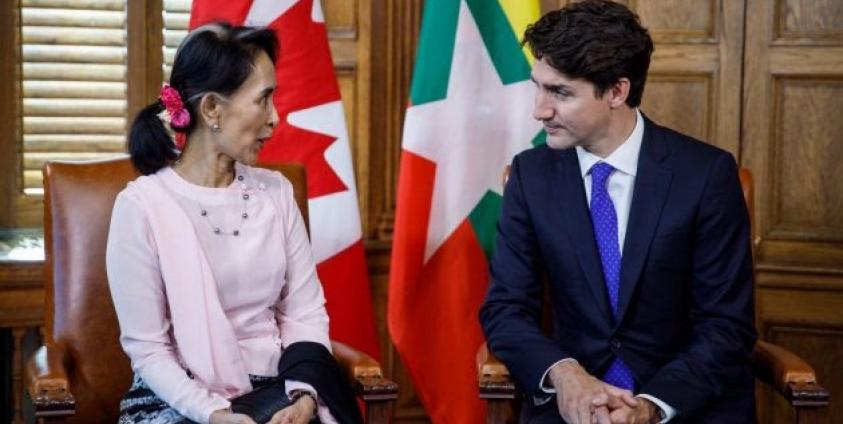As Daw Aung San Suu Kyi, Burma’s State Counsellor, concluded her Canadian tour in Toronto, members of the Karen community claimed she failed to discuss the countries armed conflict, displacement, refugees or the ongoing militarization of the country.
Members of the local Burmese community said that official event held at the Toronto City Hall and attended by the Mayor of Toronto was ‘tightly controlled’ to keep controversial issues of the agenda.
According to the KCC, the event was so strictly controlled by the Myanmar Embassy that attendees had to submit their names and any questions they wished to ask two weeks before the event. Karen community members strongly suspect the questions were screened and filtered, with the more contentious questions removed.
Sheila Htoo, a Karen youth leader in Toronto said.
“The questions selected didn’t address the most pressing questions facing Burma today, such as ongoing war, displacement, refugees, or the persecution of Rohingya,”
It was the first time ever that the Karen community in Canada have staged a public demonstration and Sheila Htoo said that it was a risk to express their resistance against the dominant media narrative of peace-making that Aung San Suu Kyi’s visit symbolized.
“It’s like, you must be an idiot to oppose this international icon. So, we made it clear in our messaging that we are not opposed to Aung San Suu Kyi, but we want her to do more, we want to hold her accountable to stand up to the military and to get to the roots of the [country’s] problem, to speak out on behalf of the suffering ethnic peoples of Burma. Above all, we are opposing the military that obstructs the peace process.”
The Karen Community of Canada issued a statement that criticized Aung San Suu Kyi and her National League of Democracy government. The KCC statement claimed that the NLD government, led by Ms Suu Kyi had “done virtually nothing to alleviate” the militarization and human ongoing rights abuses in ethnic areas. The Karen Community of Canada (KCC), represents ethnic Karen refugees from Burma now living in Canada.
Sheila Htoo and Andrew Paul, who work with the Karen communities in both Burma and Canada, pointed out the “deep contradictions between Burma’s changing international reputation and the realities of ongoing military occupation of the Karen people’s homelands.”
Ms Htoo and Mr Paul said that they were “concerned that, amid celebration of change in Burma, the voices and lived experiences of ethnic villagers such as the Karen will be ignored and further marginalized.
Ms Htoo and Mr Paul claimed that the NLD and Ms Suu Kyi “provides a public relations screen for the military, giving it totally undeserved international legitimacy while it continues its reign of terror against non-Burman ethnic communities.”
Ms Htoo and Mr Paul said that it was ironic that “the image of Burma as a reforming country renders these people even more vulnerable, as shortfalls in refugee assistance are forcing many to return to their villages even though the occupying military, which destroyed their villages in the first place, has not withdrawn any of its military bases.”
Naw Hsa Moo, a Karen community member in Canada warned countries that have given money to the Myanmar government in the name of peace, without questioning if government has made any genuine efforts to achieve peace.
“We encourage the Canadian government to be supportive, but also critical of its own support so as to ensure Canada’s democratic principles and federal concept would not be undermined by the Myanmar government.” Naw Hsa Moo said. “Where is the peace process going and why the Karen people should be supporting it if it does not give them any hope?”
Karen communities in eastern Burma said that since ceasefires agreed to in 2012 the Burma Army has increased its military presence in Karen State. Their detail statistics show that in Mutraw District of northern Karen State alone, the number of Burmese military bases has risen from 65 to 81 during the ceasefire.








